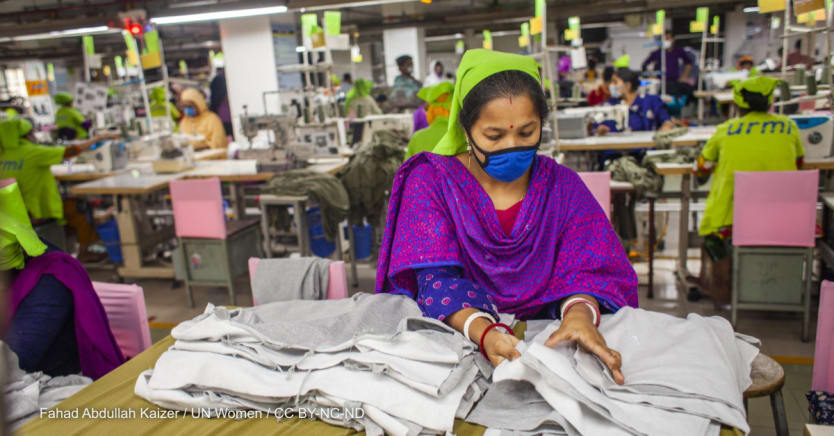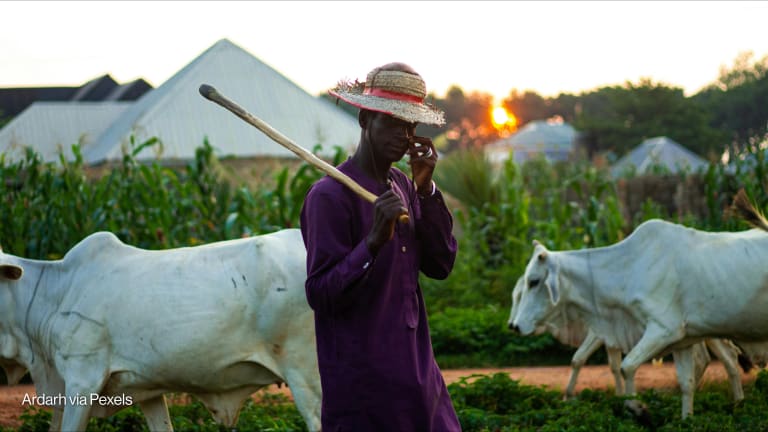Dismal Gates Goalkeepers report centers on women's power, food security

The Bill & Melinda Gates Foundation is prioritizing funding for women’s economic empowerment and climate-resilient food production in Africa as it seeks to help the world regain ground on achieving the United Nations Sustainable Development Goals following a series of global shocks, including COVID-19 and the war in Ukraine.
The Gates Foundation’s sixth annual Goalkeepers report released Tuesday showed the world falling behind on nearly all of the SDGs, which include ending world hunger and ensuring access to clean water and sanitation by 2030. The Gates’ report echoes recent findings from the U.N. Development Programme that showed 40% of countries lagging on human development indicators, such as life expectancy and per capita income in both 2021 and 2022.
“As it stands now, we’d need to speed up the pace of our progress five times faster to meet most of our goals—and even that might be an underestimate, because some of the projections don’t yet account for the impact of the pandemic, let alone the war in Ukraine or the food crisis it kicked off in Africa,” according to the Goalkeepers report.
But failure is not inevitable, according to the report. And in areas such as women’s economic empowerment and global food security, there is “a real opportunity to make a huge amount of accelerated progress,” foundation CEO Mark Suzman told Devex. This is a moment for “a call to action” to acknowledge the setbacks and refocus on opportunities to gain ground on achieving the SDGs, Suzman said.
“The goal should not simply be giving more food aid. It should be to ensure no aid is needed in the first place.”
— Bill Gates, co-chair, Gates FoundationThe foundation announced earlier this year that it would increase its annual payout by 50% to $9 billion within the next four years to provide additional funding to existing focus areas, such as global health, gender equality, and education. In this latest Goalkeepers report, foundation co-chairs Bill Gates and Melinda French Gates highlight women’s economic empowerment and food security as two areas especially ripe for further investment and innovation.
Women still left behind
Globally, just 47% of women participate in the labor force compared to 72% of men, according to data provided by Gates. Data shows the world will not reach gender equality until at least 2108 — a full three generations later than previously projected — French Gates writes in an essay included in the report.
Economic progress for women not only stalled because of COVID-19, but also by a lack of action on the hurdles that keep women jobless and poor, such as the lack of child care and control over money they’ve earned, she said.
There must be greater prioritization of women’s “power” in global poverty reduction efforts, French Gates said. She cited emergency cash transfers, which many governments provided to impoverished communities during the pandemic, as an example of where aid tools fell short in addressing gender inequality. During the early days of the pandemic, 1.3 billion people worldwide received emergency cash transfers, but it was done without considering that men are more likely to have government IDs or to appear on tax rolls — common prerequisites for banking — she writes.
The Gates Foundation has been working with the Indian government to provide digital cash transfer payments to women to give them more access to credit and online resources such as bookkeeping programs.
Some of the models used for “narrowing the digital gap between bank accounts and other financial services for women” might be expanded to countries such as Nigeria and Uganda, Suzman said.
There also should be more investment in building “childcare infrastructure” for women in lower-income countries that can give them greater autonomy and allow more to contribute to the workforce, French Gates wrote in her essay.
Gates wants ‘magic seeds’
In his essay, Bill Gates discusses the “recent shocks” of the current grain shortage caused by the war in Ukraine and ongoing threat of climate change and how they highlight the need for further innovation in agriculture and global food production — such as “climate-smart” crops that can withstand droughts, floods, and other events driven by climate change.
Specifically, more investment is needed in research and development in Africa to increase crop yields and agricultural productivity, Gates said. That would hopefully bring about the end of the need for food aid to low-income countries, which was around $6 billion in 2020 and could rise to $9.6 billion by 2030, according to Gates’ projections.
“The world should be generous and prevent people from going hungry, but in another sense, it doesn’t solve the larger problem. The goal should not simply be giving more food aid. It should be to ensure no aid is needed in the first place,” he writes.
“The foundation has invested heavily in agricultural projects in Africa and, in March 2022, jointly pledged with the Qatar Fund for Development an additional $200 million to help smallholder farmers adapt to climate change.”
Gates' staff have recently held meetings to see what can be done to “smartly” link its response to the current food security crisis to longer-term climate adaptation issues, Suzman told Devex in July.
However, the foundation’s approach to farming and climate change has not been without criticism. In a recent Seattle Times piece, some experts described the foundation as promoting an industrial model of agriculture on the African continent that relied on fertilizers and pesticides that they said were harmful to the environment. The approach runs counter to the foundation’s goals to create a “green revolution,” the critics said.
Faith groups lead call to defund industrial agriculture in Africa
A network of faith-based and civil society organizations in Africa has called on donors to stop funding the Alliance for a Green Revolution in Africa and other programs promoting industrialized agriculture on the continent.
Suzman addressed some of those concerns during a press briefing last week ahead of the report’s release when he was asked about the foundation’s push to help African farmers gain access to more fertilizer supply in a market dominated by high-income countries. The use of fertilizers, specifically nitrogen-based fertilizers, has been linked to rising global emissions of nitrous oxide, which is a greenhouse gas.
Africa, as a continent, has contributed the least to greenhouse gas emissions, uses far fewer fossil-fuel-based inputs such as fertilizer, and is where the needs are greatest, Suzman said. Climate mitigation and the reduction of greenhouse gases are “obviously critical,” but there also should be more discussion of climate adaptation, “which is how do you actually adapt to real-time shifts in climate,” he said.
When the broader conversations focus only on climate mitigation, “there is always a risk that that discussion then becomes a reason not to provide the farmers in Africa and Asia, who already have access to far fewer resources than their wealthier counterparts, the tools they need, which include the fertilizer and the seeds,” Suzman said.
The U.N. Climate Change Conference that will be hosted by Egypt in November is an opportunity to push for a bigger global focus on agricultural adaptation, he said.
Update, Sept. 13, 2022: This article has been updated to reflect that the additional $200 million for smallholder farmers was given jointly with the Qatar Fund for Development.

Search for articles
Most Read
- 1
- 2
- 3
- 4
- 5








